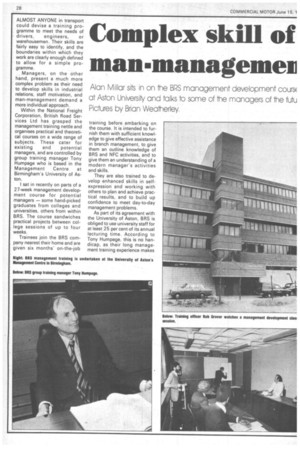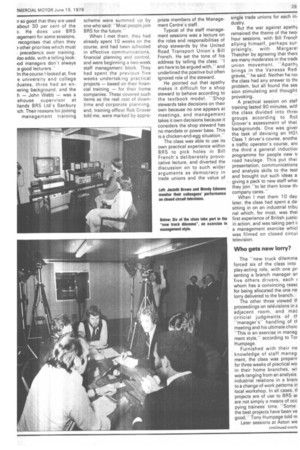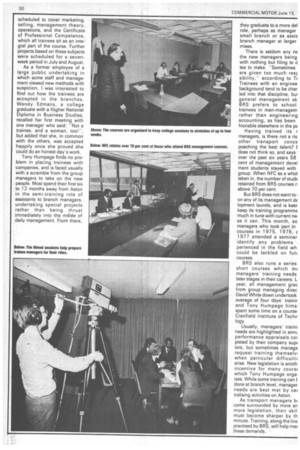Complex skill of man-imanagemem
Page 30

Page 31

Page 32

If you've noticed an error in this article please click here to report it so we can fix it.
Alan Millar sits in on the BRS management development course at Aston University and talks to some of the managers of the futu Pictures by Brian Weatherley.
ALMOST ANYONE in transport could devise a training programme to meet the needs of
drivers, engineers, Or warehousemen. Their skills are fairly easy to identify, and the boundaries within which they work are clearly enough defined to allow for a simple programme.
Managers, on the other hand, present a much more complex problem as their need to develop skills in industrial relations, staff motivation, and man-management demand a more individual approach.
Within the National Freight Corporation, British Road Services Ltd has grasped the management training nettle and organises practical and theoretical courses on a wide range of subjects. These cater for existing and potential managers, and are controlled by group training manager Tony Humpage who is based in the Management Centre at Birmingham's University of Aston.
I sat in recently on parts of a 27-week management development course for potential managers — some hand-picked graduates from colleges and universities, others from within BRS. The course sandwiches practical projects between college sessions of up to four weeks.
Trainees join the BRS company nearest their home and are given six months' on-the-job training before embarking on the course. It is intended to furnish them with sufficient knowledge to give effective assistance in branch management, to give them an outline knowledge of BRS and NFC activities, and to give them an understanding of a modern manager's activities and skills.
They are also trained to develop enhanced skills in selfexpression and working with others to plan and achieve practical results, and to build up confidence to meet day-to-day management problems.
As part of its agreement with the University of Aston, BRS is obliged to use university staff for at least 25 per cent of its annual lecturing time. According to Tony Humpage, this is no handicap, as their long management training experience makes n so good that they are used about 30 per cent of the a. He does use BRS iagement for some sessions, recognises that often they a other priorities which must
precedence over training. ilso adds, with a telling look: lad managers don't always .e good lecturers.
ln the course I looked at, five e university and college duates, three had an eniering background, and the h — John Webb — was a ehouse supervisor at lands BRS Ltd's Banbury tich. Their reasons for joining management training scheme were summed up by one who said: "Most people join BRS for the future.
When I met them, they had already spent 10 weeks on the course, and had been schooled in effective communications, financial planning and control, and .were beginning a two-week staff management block. They had spent the previous five weeks undertaking practical projects — based on their financial training — for their home companies. These covered such items as the real cost of downtime and corporate planning, and, training officer Rob Grover told me, were marked by appro
priate members of the Management Centre's staff.
Typical of the staff management sessions was a lecture on the roles and responsibilities of shop stewards by the United Road Transport Union's Bill French. He set the tone of his address by telling the class: ''l am here to be argued with," and underlined the positive but often ignored role of the steward.
He pointed out that apathy makes it difficult for a shop steward to behave according to the textbook model. "Shop stewards take decisions on their own because no one appears at meetings, and management takes it own decisions because it considers the shop steward has no mandate or power base. This is a chicken-and-egg situation.
The class was able to use its own practical experience within BRS to pick holes in Bill French's deliberately provocative lecture, and diverted the discussion on to such wider arguments as democracy in trade unions and the value of single trade unions for each industry.
But the war against apathy remained the theme of the two hour sessions, with Bill French allying himself, perhaps surprisingly, with Margaret Thatcher by agreeing that therE are many moderates in the tradE union movement. "Apath) brings in the Vanessa Red graves," he said. Neither he no' the class had any answer to thE problem, but all found the ses sion stimulating and thought provoking.
A practical session on staf training lasted 90 minutes, with the class divided into threr groups according to Rot Grover's assessment of thei backgrounds. One was giver the task of devising an HG \ Class 1 driver's course, anothe a traffic operator's course, am the third a general inductior programme for people new tr road haulage. This put thei presentation, communications and analysis skills to the test and brought out such ideas a giving a pack to new staff whei they join -to let them know thi company cares."
When I met them 10 day later, the class had spent a da sitting in on an industrial tribu nal which, for most, was thei first experience of British justic. in action, and was taking part ii a management exercise whicl was filmed on closed circui television.
Who gets new lorry?
The "new truck dilemma forced six of the class into play-acting role, with one prl senting a branch manager ar five others drivers, each whom has a convincing reasc for being allocated the one ne lorry delivered to the branch.
The other three viewed th proceedings on televisions in e adjacent room, and mac
criticial judgments of th "manager'shandling of tF
meeting and his ultimate choic "This is an exercise in manag merit style," according to Tor Humpage.
Furnished with their ne knowledge of staff manag
ment, the class was preparir for three weeks of practical wo in their home branches, wiwork ranging from an analysis
industrial relations in a bran( to a change of work patterns in local workshop. In all cases, tt projects are of use to BRS ar are not simply a means of occ pying trainees' time. "Some the best projects have been ye good," Tony Humpage told m Later sessions at Aston we scheduled to cover marketing, selling, management theory, operations, and the Certificate of Professional Competence, which all trainees sit as an integral part of the course. Further projects based on these subjects were scheduled for a sevenweek period in July and August.
As a former employee of a large public undertaking in which some staff and management viewed new methods with suspicion, I was interested to find out how the trainees are accepted in the branches. Wendy Edmans, a college graduate with a Higher National Diploma in Business Studies, recalled her first meeting with one manager who said: "Not a trainee, and a woman, tool", but added that she, in common with the others, was accepted happily once she proved she could do an honest day's work.
Tony Humpage finds no problem in placing trainees with companies, and is faced usually with a scramble from the group managers to take on the new people. Most spend their first six to 12 months away from Aston in the semi-training role of assistants to branch managers, undertaking special projects rather than being thrust immediately into the melee of daily management. From there, they graduate to a more del role, perhaps as manager small branch or as assis branch manager at larger mises.
There is seldom any ris the new managers being with nothing but filing to tea to make. "Sometimes are given too much resf sibility," according to T( Trainees with an enginee background tend to be char led into that discipline, bu' general management sk BRS prefers to school trainees in man-managem rather than engineering accounting, as has been hionable elsewhere in the pE Having trained its r managers, is there not a ris other transport conce poaching the best talent? E does not think so, and says over the past six years 58 cent of management devel ment students stayed with group. When NFC as a whol taken in, the number of stud( retained from BRS courses r above 70 per cent.
But BRS does not want to on any of its management dE lopment laurels, and is keer keep its training programme much in tune with current rm as it can. This month, so managers who took part in courses in 1975, 1976, E. 1977 attended a seminar identify any problems perienced in the field wh could be tackled on futt courses.
BRS also runs a series short courses which m( managers' training needs later stages in their careers. L year, all management grac from group managing direc David White down undertook average of four days' trainir and Tony Humpage hims, spent some time on a course Cranfield Institute of Techn logy.
Usually, managers' trainii needs are highlighted in annt. performance appraisals ow pleted by their company sup( iors, but sometimes manage request training themselvi when particular difficultii arise. New legislation is anoth incentive for many cours( which Tony Humpage orga ises. While some training can t done at branch level, manager needs are best met by cei tralising activities on Aston.
As transport managers bi come surrounded by more an more legislation, their skil must become sharper by th minute. Training, along the linE practised by BRS, will help me( these demands.




























































































































